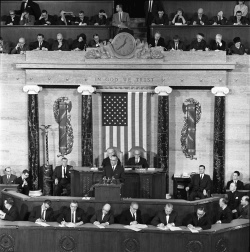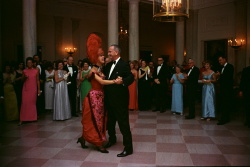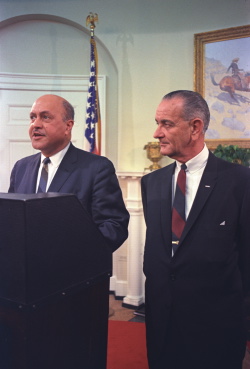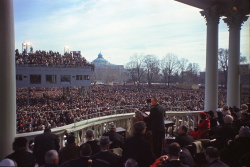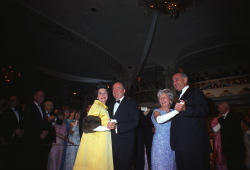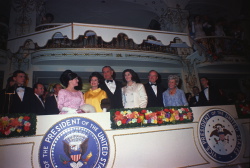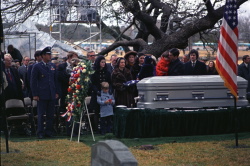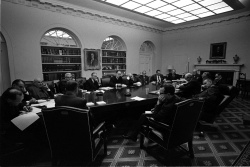1st2nd3rd4th5th6th7th8th9th10th11th12th13th14th15th16th17th18th19th20th21st22nd23rd24th25th26th27th28th29th30th31st
January 1st
On this day in 1964, President Johnson sent a New Year’s message to leaders of the Soviet Union, Nikita Khrushchev and Leonid Brezhnev.
“The American people and their Government have set the strengthening of peace as their highest purpose in the New Year. I myself am wholly committed to the search for better understanding among peoples everywhere. ‘Peace on Earth, good will toward men’ need not be an illusion; we can make it a reality. The time for simply talking about peace, however, has passed—1964 should be a year in which we take further steps toward that goal. In this spirit I shall strive for the further improvement of relations between our two countries. In our hands have been placed the fortunes of peace and the hope of millions; it is my fervent hope that we are good stewards of that trust…”
On this day in 1964, President Johnson sent a New Year’s message to General (Duong Van) Minh, the Chairman of the Military Revolutionary Council in South Viet-Nam.
“As we enter the New Year of 1964, I want to wish you, your Revolutionary Government, and your people full success in the long and arduous war which you are waging so tenaciously and bravely against the Viet Cong forces directed and supported by the Communist regime in Hanoi. Ambassador (Henry Cabot) Lodge and Secretary (Robert) McNamara have told me about the serious situation which confronts you and of the plans which you are developing to enable your armed forces and your people to redress this situation.
“This new year provides a fitting opportunity for me to pledge on behalf of the American Government and people a renewed partnership with your government and people in your brave struggle for freedom. The United States will continue to furnish you and your people with the fullest measure of support in this bitter fight. We shall maintain in Vietnam American personnel and material as needed to assist you in achieving victory. Our aims are, I know, identical with yours: to enable your government to protect its people from the acts of terror perpetrated by Communist insurgents from the north. As the forces of your government become increasingly capable of dealing with this aggression, American military personnel in South Vietnam can be progressively withdrawn.
…
“Thus, your government and mine are in complete agreement on the political aspects of your war against the forces of enslavement, brutality, and material misery. Within this framework of political agreement we can confidently continue and improve our cooperation. I am pleased to learn from Secretary McNamara about the vigorous operations which you are planning to bring security and an improved standard of living to your people.
…
“We will do our full part to ensure that under your leadership your people may win a victory—a victory for freedom and justice and human welfare in Vietnam.”
On this day in 1964, President Johnson made a statement in response to a report on the 1963 Campaign for Reaching School Dropouts.
“The 1963 results show that, where local effort was made, 1 out of 2 actual or potential dropouts returned to school—and 9 out of 10 are staying in school. With experience, we can do even better. I am asking Dr. (Francis) Keppel to send every school district in the Nation a full report on these pilot programs together with guidelines for conducting successful dropout campaigns. It is my hope that in 1964 at least a majority of our school districts—and all of the metropolitan districts—will have voluntary citizen-supported campaigns underway.”
January 2nd
On this day in 1968, President Johnson signed into law The Elementary and Secondary Education Act Amendments of 1967 (PL 90-247) which established bilingual education programs for non-English speaking children, provided more funds for special education for handicapped children, authorized new efforts to prevent dropouts, and provided new planning help for rural schools.
On this day in 1964, the Scapino Ballet performed for the Children's Ballet Party at the White House.
January 3rd
On this day in 1961, Johnson took the oath of office for a full six-year term in the Senate and immediately resigned to become Vice-President.
January 4th
On this day in 1965, President Johnson gave an annual message to the Congress on the State of the Union.
“And so tonight, now, in 1965, we begin a new quest for union. We seek the unity of man with the world that he has built, with the knowledge that can save or destroy him, with the cities which can stimulate or stifle him, with the wealth and the machines which can enrich or menace his spirit.”
January 5th
On this day in 1966, President Johnson spoke on the telephone with Roy Wilkins, Executive Director of the NAACP, about the Great Society program.
On this day in 1968, President Johnson made a statement on Federally supported vocational and technical education programs.
“Helping a man or woman learn the skills needed to secure a good job is one of our important tasks.
“The vocational training partnership between Federal, State, and local governments prepares skilled workers to become self-supporting, to contribute many times over to the wealth of our Nation.”
January 6th
On this day in 1964, President Johnson made a statement on the effort against organized crime and racketeering. The Attorney General’s report pointed out that the Federal Government’s intensive drive against racketeering began in 1961, and that as a result of Federal efforts in 1963 scores of racketeers, who for years corrupted their communities, were now serving Federal prison sentences. This had stimulated new law enforcement vigor at the State and local levels. Racketeering indictments, which had almost tripled from 1961 to 1962, had doubled again in 1963. Of even greater significance, the report continued, was the fact that convictions had also increased greatly.
January 7th
On this day in 1965, President Johnson made a statement on his special message to the Congress on the nation’s health.
“I am proposing that every person over 65 years of age be spared the darkness of sickness without hope. I am asking that every person, under social security, during his working life contribute a modest amount, so that his basic health services can be financed. It will help meet the costs of hospital bills without in any way interfering with the freedom to choose their doctor or to choose their hospital.
“I am asking for the establishment of regional treatment centers throughout our entire Nation where the most advanced diagnosis and treatment can be made accessible to millions of people who cannot now get such treatment. We have within our reach the means and the knowledge to begin a massive attack on heart disease, cancer, stroke, and other crippling diseases.
“I am asking for a program to bring new hope to the mentally ill and the mentally retarded. I am asking for programs to improve the care of the health of our preschool and school age children as well as help our States and communities improve their health services to the needs of our Nation.
“I am asking for additional funds to construct more medical schools, new funds to help these schools cover their operating costs, and to begin a system of scholarships for needy medical and dental students…”
On this day in 1964, President Johnson signed Executive Order 11138 authorizing acceptance of the United Nations Medal and Service Ribbon.
By virtue of the authority vested in me as President of the United States and as Commander in Chief of the armed forces of the United States, I hereby authorize the Secretary of Defense, with respect to members of the Army, Navy, Air Force, and Marine Corps, and the Secretary of the Treasury, with respect to members of the Coast Guard when it is not operating as a service in the Navy, to prescribe regulations under which the United Nations Medal and Service Ribbon may be accepted by members of the armed forces who have been determined eligible for consideration in accordance with the Regulations for the United Nations Medal, promulgated by the United Nations Organization on July 30, 1959. A determination that service with the United Nations in a particular geographic area or for a particular purpose constitutes a justifiable basis for authorizing acceptance of the United Nations Medal and Service Ribbon by eligible members of the armed forces of the United States shall be made with the concurrence of the Secretary of State.
On this day in 1968, President and Mrs. Johnson hosted a dinner at the LBJ Ranch for Prime Minister and Mrs. Levi Eshkol of Israel.
January 8th
On this day in 1964, Johnson delivered his first State of the Union message as President in which he singled out education as a key remedy for poverty, declaring War on Poverty.
Also, Johnson asked Congress,
“Let this session of Congress be known as the session which did more for civil rights than the last hundred sessions combined…”
January 9th
On this day in 1964, Panamanian President Robert Chiari broke diplomatic relations with the U.S. after riots erupted when U.S. students raised the American flag in the Canal Zone. After tensions subsided, President Johnson began efforts to renegotiate the Panama Canal Treaty; diplomatic relations were restored on April 3.
On this day in 1969, President Johnson presented the NASA Distinguished Service Medal to the Apollo 8 Astronauts (James A. Lovell, Jr., Frank Borman, and William A. Anders).
“Gentlemen, I am very proud to be privileged to present you with the NASA Distinguished Service Medals. They are very small tokens of our appreciation for what you have done for our country and for the world and for us.
“This is the last time that I shall participate in a space ceremony as President of the United States.
“I am proud that I have stood with the space effort from its first days, and I am so glad to see it now flower in this most marvelous achievement…”
January 10th
On this day in 1967, President Johnson gave his annual message to the Congress on the State of the Union.
“At home, the question is whether we will continue working for better opportunities for all Americans, when most Americans are already living better than any people in history.
“Abroad, the question is whether we have the staying power to fight a very costly war when the objective is limited and the danger to us is seemingly remote.
“So our test is not whether we shrink from our country’s cause when the dangers to us are obvious and close at hand, but, rather, whether we carry on when they seem obscure and distant and some think that it is safe to lay down our burdens.
“I have come tonight to ask this Congress and this Nation to resolve that issue: to meet our commitments at home and abroad, to continue to build a better America, and to reaffirm this Nation's allegiance to freedom…”
January 11th
On this day in 1968, President Johnson wrote a memorandum directing reduction of AID [Agency for International Development] expenditures overseas in connection with the Balance of Payments Program. LBJ wrote,
I recently outlined a broad program to correct the balance of payments deficit. As a part of the Government actions under this program, we must take even more stringent steps to minimize the balance of payments costs of our AID programs. I therefore request that you take steps to reduce your expenditures overseas in calendar 1968 by a minimum of $100 million below what they were in 1967…
On this day in 1968, President Johnson gave remarks upon presenting the U.S. Savings Bond Minuteman Award to the Tactical Air Command’s 12th Air Force, at Bergstrom Air Force Base, Austin, Texas.
“This Minuteman Flag is what we call the patriot’s emblem, because it declares that more than 90 percent of those of you who make up this command—nine out of every ten—have bought savings bonds in 1967.
“So you not only supply the brain, the brawn, the horsepower, the will, and the courage to protect this country—you are supplying your part of the money.
…
“Today for the first time we are awarding these Minuteman Flags to battlefield units. In Vietnam today, 115 units fly this flag, and they are not alone.
…
“Most of all, I am proud of you men who, out of the pitiful earnings that you get and the modicum pay that is in your envelope, still think enough of your country not only to give your life for it but to invest some of your dollars in it.
“That is what is going to preserve freedom. That is what is going to save this land.”
January 12th
On this day in 1965, President Johnson presented remarks on “The Educational Message to Congress.”
“I am today sending the 89th Congress a message on the number one business on this Nation’s agenda, and that is the education of our young people. I have proposed that we set full educational opportunity as our first national goal.
“Every child must be encouraged to get as much education as he has the ability to take. We want this for his sake, and we want this for the country’s sake.
“The cost of neglecting this runs very high indeed. One student out of every three that are now in the fifth grade will drop out before finishing high school. One million a year will simply quit school unless their desire to learn is greatly stimulated in the days ahead.
“We have statistics which show the price they will pay in unemployment and in substandard living, but the very important thing, too, is that the Nation also pays a great price.
“We now spend about $450 a year to keep one child in school, but it costs you $2,500 a year for a family on relief, and it costs us $3,500 a year for that boy that dropped out of that $450-a-year school and became a criminal in State prison.
“We spend seven times as much on a youth that has gone bad as on helping him to make good.
“Education is ‘the guardian genius of our democracy.’ Nothing really means more to our future—not our military defenses, not our missiles or our bombers, not our production economy, not even our democratic system of government, for all of these are worthless if we lack the brain power to support them and to sustain them.
“We know that nuclear age problems cannot be solved with horse and buggy learning, so the proposals that your President submitted to Congress today will match the size of these tasks.
“My budget for education and all programs relating to education for fiscal year 1966 will contain a total of $8,600 million, and this includes funds to expand programs started last year as well as $1½ billion to finance new programs—over $8 billion. It was something over $4 billion in the budget when I took office—the ’64 budget. So, from ’64 to ’66 we have gone from $4 billion to $8 billion.
“Now, this is a large expenditure, but it is a small price to pay for preserving this Nation, for saving our free enterprise system, and for developing our country’s most priceless resource: our young people.”
On this day in 1966, President Johnson delivered his annual message to the Congress on the State of the Union.
“Because of Vietnam, we cannot do all that we should or all that we would like to do. We will ruthlessly attack waste and inefficiency. We will make sure that every dollar is spent with the thrift and with the common sense which recognizes how hard the taxpayer worked in order to earn it.
“We will continue to meet the needs of our people by continuing to develop the Great Society.
“Last year alone, the wealth that we produced increased $47 billion, and it will soar again this year to a total over $720 billion.
“Because our economic policies have produced rising revenues, if you approve every program that I recommend tonight, our total budget deficit will be one of the lowest in many years. It will be only $1.8 billion next year. Total spending in the administrative budget will be $112.8 billion. Revenues next year will be $111 billion…”
On this day in 1965, President and Mrs. Johnson hosted a head-of-state dinner at the White House for Prime Minister Eisaku Sato of Japan.
January 13th
On this day in 1964, President Johnson made remarks to representatives of organizations interested in immigration and the problems of refugees.
“So, instead of using the test of where the immigrant was born, I would hope that we could apply a somewhat more nondiscriminatory test of the very special training and qualifications of the immigrant and his relationship to the persons in the United States and, actually, the time that he applies for admission…”
On this day in 1969, President Johnson made remarks in New York City at a Farewell Dinner honoring his presidency.
“When I look back at conservation, civil rights, education, health and consumer legislation, and the War on Poverty, I think, ‘So little have we done. So much have we yet to do.’
“So, as we prepare to depart 7 days from now, we leave the plow in the furrow, and, actually, the field is only half tilled.
“In the sweep of things, a President has only so much time—a very allotted time—to do the things that he really believes in and he thinks must be done. Within those limits he can only give it the best he has.
…
“I know that most of you have been there with me all the time—every step of the way, and I further know more—and I know it with a great sense of pride that really touches every fiber of my soul—I know that I have given it everything I have had.”
On this day in 1965, President Johnson sent a special message to Congress on immigration.
“A change is needed in our laws dealing with immigration. Four Presidents have called attention to serious defects in this legislation. Action is long overdue.
“I am therefore submitting, at the outset of this Congress, a bill designed to correct the deficiencies. I urge that it be accorded priority consideration.
“The principal reform called for is the elimination of the national origins quota.
…
“To replace the quota system, the proposed bill relies on a technique of preferential admissions based upon the advantage of our nation of the skills of the immigrant, and the existence of a close family relationship between the immigrant and people who are already citizens or permanent residents of the United States…”
January 14th
On this day in 1969, President Johnson gave an annual message to the Congress on the State of the Union for the sixth and last time.
On this day in 1964, opera singer Robert Merrill performed for the White House dinner of Italian President and Mrs. Segni.
January 15th
On this day in 1965, President Johnson spoke on the telephone with the Reverend Martin Luther King, Jr., about Great Society legislation.
On this day in 1964, President Johnson gave remarks to leaders of organizations concerned with the problems of Senior Citizens.
“One problem that I think that we have met this morning to tackle is the need for a social security health insurance plan. This great Nation—the most powerful of all nations—should no longer continue to ask our old people to trade dignity and self-respect for hospital and nursing home care. This is something that I think is good for all of us to realize and most of us to remember.”
On this day in 1965, Canadian Prime Minister and Mrs. Lester Pearson visited the President and Mrs. Johnson at the LBJ Ranch.
January 16th
On this day in 1967, President Johnson spoke on the telephone with the Reverend Billy Graham about Graham’s recent trip to Vietnam.
On this day in 1969, President Johnson signed Executive Order 11446 authorizing the acceptance of service medals and ribbons from multilateral organizations other than the United Nations.
“By virtue of the authority vested in me as President of the United States and as Commander in Chief of the Armed Forces of the United States, I hereby authorize the Secretary of Defense, with respect to members of the Army, Navy, Air Force, and Marine Corps, and the Secretary of Transportation, with respect to members of the Coast Guard when it is not operating as a service in the Navy, to prescribe regulations for the acceptance of medals and ribbons which are offered by multilateral organizations, other than the United Nations, to members of the Armed Forces of the United States in recognition of service conducted under the auspices of those organizations. A determination that service for a multilateral organization in a particular geographical area or for a particular purpose constitutes a justifiable basis for authorizing acceptance of the medal or ribbon offered to eligible members of the Armed Forces of the United States shall be made with the concurrence of the Secretary of State.”
On this day in 1968, President Johnson signed Executive Order 11448 establishing the Meritorious Service Medal.
“There is hereby established a Meritorious Service Medal, with accompanying ribbons and appurtenances, for award by the Secretary of a military department or the Secretary of Transportation with regard to the Coast Guard when not operating as a service in the Navy, or by such military commanders or other appropriate officers as the Secretary concerned may designate, to any member of the armed forces of the United States, or to any member of the armed forces of a friendly foreign nation, who has distinguished himself by outstanding meritorious achievement or service…”
January 17th
On this day in 1967, actress and singer Carol Channing performed Hello Dolly for the dinner honoring The Vice-President (Hubert Humphrey), The Speaker of the House (John W. McCormack), and The Chief Justice (Earl Warren).
On this day in 1968, President Johnson gave his annual message to the Congress on the State of the Union.
“I report to you that our country is challenged, at home and abroad:
“—that it is our will that is being tried, not our strength; our sense of purpose, not our ability to achieve a better America;
“—that we have the strength to meet our every challenge; the physical strength to hold the course of decency and compassion at home; and the moral strength to support the cause of peace in the world…”
On this day in 1967, President Johnson gave a toast at a dinner honoring the Vice-President (Hubert H. Humphrey), the Speaker of the House (John W. McCormack), and the Chief Justice of the Supreme Court (Earl Warren).
“Each of these men has passed through many trials. Each has borne the burden of many conflicts. Each has suffered the venomous abuse which often attends good men in public life.
“Yet never have they retreated. Never have they for one moment withdrawn from the struggle. Never have they flinched from the total commitment to freedom…”
On this day in 1969, President Johnson attended the District of Columbia Ceremony honoring the President and Mrs. Johnson.
The President and Mrs. Johnson were presented with plaques and gold keys to the city designed by Ivan Chermayeff, one of the Nation's leading graphic artists, in recognition of their “rich and lasting contributions to the District of Columbia and its people.”
The President’s plaque was inscribed,
Friend, benefactor and champion of the City of Washington, 1963–1969 … in appreciation and esteem from the people of the District of Columbia whose cause he made his own.
His key bore the words,
Friend, benefactor, champion.
The First Lady’s plaque read,
To Mrs. Lyndon B. Johnson whose quiet transforming touch gave to the citizens of Washington not only a more beautiful landscape, but a new vision of their City’s possibilities … in admiration and affection from the people of the City.
Her key bore the words,
In admiration and affection to one who gave us new vision.
January 18th
On this day in 1966, President Johnson attended the Secretary of the Department of Housing and Urban Development swearing-in ceremony held for Robert Weaver. Mr. Weaver was the first African-American cabinet member.
On this day in 1969, President Johnson made a statement urging the preservation of the Big Thicket of Southeast Texas as a Wilderness Area.
“This unique and beautiful woodland can be a source of enjoyment for generations yet to come. We should preserve as much of it as we can without delay, and, as quickly as possible, we should add it to our great inventory of national parks and recreation areas…”
January 19th
On this day in 1966, President Johnson signed Executive Order 11267 relating to the implementation of the Treaty of Friendship and General Relations between the United States and Spain.
Under and by virtue of the authority vested in me as President of the United States of America, particularly with respect to the conduct of the foreign relations of this Nation, and in order to ensure that Article XXIV of the Treaty of Friendship and General Relations between the United States and Spain (33 Stat. 2105, 2117) can be observed and fulfilled with good faith by the United States, I hereby designate the Attorney General of the United States, and such other officers and employees of the Executive Branch of the Government as he may from time to time specify, to be the ‘competent national authorities’ on the part of the United States within the meaning of Article XXIV of the Treaty. The Attorney General, and the designees specified by him, shall fulfill the obligations assumed by the United States pursuant to Article XXIV of the Treaty in the manner and form therein prescribed.
January 20th
On this day in 1965, Lyndon Johnson took the Oath of Office as President of the United States. The “Great Society” program became the agenda for Congress: aid to education, protection of civil rights (including the right to vote), urban renewal, Medicare, conservation, beautification, control and prevention of crime and delinquency, promotion of the arts, and consumer protection.
Johnson’s foreign policy rested on four principles: deterring and resisting aggression, promoting economic and social progress, encouraging cooperation among nations of the same region and seeking reconciliation with the communist world.
On this day in 1961, Lyndon Johnson was administered the oath of office as Vice-President of the United States by the Speaker of the House of Representatives, Sam Rayburn. As Vice-President, Johnson was a member of the Cabinet and the National Security Council, Chairman of the National Aeronautics and Space Council, Chairman of the President’s Committee on Equal Employment Opportunity, and Chairman of the Peace Corps Advisory Council.
On this day in 1965, President Johnson attended the Presidential Inaugural Ball at the Mayflower Hotel, the Statler-Hilton Hotel, the Shoreham Hotel, the Sheraton-Park Hotel, and the National Guard Armory in Washington, D.C.
On this day in 1969, Lyndon Johnson and his family returned to Texas and the LBJ Ranch, following the inauguration of President Richard M. Nixon.
January 21st
On this day in 1966, President Johnson spoke on the telephone with Secretary of State Dean Rusk about Vietnam.
On this day in 1961, Lyndon Johnson spent his first full day as Vice-President.
January 22nd
On this day in 1973, following a short retirement, Lyndon Johnson passed away. He was buried in the family cemetery at the LBJ Ranch near his birthplace. During his retirement he wrote his memoirs, The Vantage Point, taught students, and participated in the beginning of a series of national symposia on the critical issues of modern America held at the Lyndon B. Johnson Library.
January 23rd
On this day in 1968, In a National Security meeting, President Johnson and his foreign policy advisers discussed recent events including the seizure of the USS Pueblo by North Korea, the crash of a U.S. aircraft carrying nuclear weapons, and other incidents in Vietnam, Cambodia, South Korea, and the Middle East.
On this day in 1964, President Johnson made remarks on the ratification of the Twenty-Fourth Amendment to the Constitution abolishing poll taxes.
“Today, as they have always done throughout the long and rewarding history of this country, the people of the United States made known their views.
“The abolishment of the poll tax as a condition to voting in Federal elections is the forward step of a modern society. It is a verification of people’s fights which are rooted so deeply in the mainstream of this Nation’s history.
…
“It is my hope that the enactment of this amendment will encourage more people in every State to use, in greater numbers, the greatest gift for any land of liberty: the right to vote.”
On this day in 1968, President Johnson sent a message to Congress, “To Earn a Living: The Right of Every American.”
I will ask the Congress to appropriate $2.1 billion for our manpower programs for fiscal 1969.
- This is the largest such program in the Nation’s history.
- It is a 25 percent increase over fiscal 1968.
- It will add $442 million to our manpower efforts.
In a vigorous, flourishing economy, this is a program for justice as well as for jobs.
These funds will enable us to continue and strengthen existing programs, and to advance to new ground as well.With this program, we can reach 1.3 million Americans, including those who have rarely if ever been reached before—the hard-core unemployed…
January 24th
On this day in 1968, President Johnson sent a special message to Congress urging passage of civil rights legislation and asked Congress for a record $112.9 billion for fiscal 1967 to wage war in Vietnam and to build the Great Society.
When we speak of overcoming discrimination we speak in terms of groups—Indians, Mexican-Americans, Negroes, Puerto Ricans, and other minorities. We refer to statistics, percentages, and trends.
Now is the time to remind ourselves that these are problems of individual human beings—of individual Americans.
—Housing discrimination means the Negro veteran of Vietnam cannot live in an apartment which advertises vacancies.
—Employment statistics do not describe the feeling of a Puerto Rican father who cannot earn enough to feed his children.
—No essay on the problems of the slum can reveal the thoughts of a teenager who believes there is no opportunity for him as a law-abiding member of society.
Last summer our Nation suffered the tragedy of urban riots. Lives were lost; property was destroyed; fear and distrust divided many communities.
The prime victims of such lawlessness—as of ordinary crime—are the people of the ghettoes.
No people need or want protection—the effective, non-discriminatory exercise of the police power—more than the law-abiding majority of slum-dwellers. Like better schools, housing, and job opportunities, improved police protection is necessary for better conditions of life in the central city today. It is a vital part of our agenda for urban America.
Lawlessness must be punished—sternly and promptly.
But the criminal conduct of some must not weaken our resolve to deal with the real grievances of all those who suffer discrimination. Nothing can justify the continued denial of equal justice and opportunity to every American.
Each forward step in the battle against discrimination benefits all Americans…
January 25th
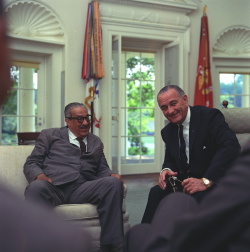 Meeting regarding announcement of Thurgood Marshall's nomination as an Associate Justice of the Supreme Court of the United States
Meeting regarding announcement of Thurgood Marshall's nomination as an Associate Justice of the Supreme Court of the United Statescredit: Frank Wolfe
On this day in 1967, President Johnson spoke on the telephone with Attorney General Ramsey Clark about appointing Thurgood Marshall to the U. S. Supreme Court. Marshall would become the first African American on the U. S. Supreme Court.
On this day in 1968, actors Carol Lawrence and Gordon MacRae performed in I Do! I Do! for the White House dinner honoring The Vice-President (Hubert Humphrey), The Speaker of the House (John McCormack), and The Chief Justice (Earl Warren).
On this day in 1973, a memorial service was held for President Lyndon B. Johnson at National City Christian Church in Washington, D.C.
January 26th
On this day in 1968, President Johnson addressed the nation about the situation with North Korea.
On January 19, a 31-man team of North Korean raiders invaded Seoul with the object of murdering the President of the Republic of Korea.
…
This week the North Koreans committed yet another wanton and aggressive act by seizing an American ship and its crew in international waters. Clearly, this cannot be accepted.
We are doing two things: First, we are very shortly today taking the question before the Security Council of the United Nations. The best result would be for the whole world community to persuade North Korea to return our ship and our men and to stop the dangerous course of aggression against South Korea.
…
Second, we have taken and we are taking certain precautionary measures to make sure that our military forces are prepared for any contingency that might arise in this area…
On this day in 1966, actress and singer Tammy Grimes, the U.S. Marine Band, and the U.S. Air Force Band performed for the dinner honoring Vice-President Hubert Humphrey and The Chief Justice, Earl Warren.
On this day in 1967, President and Mrs. Johnson hosted a luncheon at the White House for President-elect of Brazil and Mrs. Costa e Silva.
January 27th
On this day in 1967, President Johnson, along with leaders from Great Britain, the U.S.S.R., and 57 other nations, signed the Treaty on Outer Space governing the activities of nations in the exploration and use of outer space. At a reception two hours later, the President was notified in a note that three U.S. astronauts, Virgil I. “Gus” Grissom, Edward H. “Ed” White, and Roger B. Chaffee, had died in a fire during an Apollo 1 training mission.
In his memoir, The Vantage Point, Johnson wrote,
The shock hit me like a physical blow. I heard the applause for (Secretary of Commerce John) Connor’s toast die down, and a silence began to settle over the room. Our guests were all looking at me. ‘I have a sad announcement to make,’ I said, and read the note aloud. There was a stir in the stillness of the room and the happy atmosphere changed to one of stunned grief.
…
We had known from the beginning that there would be setbacks, and perhaps even tragedy, involved in the space program. But no amount of planning could have adequately prepared us for the horror of that moment.
On this day in 1964, President and Mrs. Lyndon Johnson hosted a luncheon at the White House for Queen Frederika of Greece.
January 28th
On this day in 1966, President Johnson met with “The Wise Men” (his advisors) in the Cabinet Room of the White House for a discussion on Vietnam.
On this day in 1967, President Johnson signed Executive Order 11324 creating an emergency board to investigate disputes between the carriers represented by the National Railway Labor Conference and certain of their employees.
January 29th
On this day in 1968, President Johnson delivered his Annual Budget Message to the Congress for Fiscal Year 1969.
“After carefully weighing priorities, I am proposing three kinds of actions:
“First, I have carefully examined the broad range of defense and civilian needs, and am proposing the selective expansion of existing programs or the inauguration of new programs only as necessary to meet those urgent requirements whose fulfillment we cannot delay.
“Second, I am proposing delays and deferments in existing programs wherever this can be done without sacrificing vital national objectives.
“Third, I am proposing basic changes, reforms, or reductions designed to lower the budgetary cost of a number of Federal programs which, in their present form, no longer effectively meet the needs of today.
…
“There is no question that, as a nation, we are strong enough, we are intelligent enough, we are productive enough to carry out our responsibilities and take advantage of our opportunities. Our ability to act as a great nation is not at issue. It is our will that is being tested.”
On this day in 1964, President Johnson made a statement following the launch of the first U. S. satellite by Saturn I.
“This is a giant step forward for the United States space effort. We have now proven we have the capability of putting great payloads into space. We have demonstrated not only enormous boost capability, but we have proved the effectiveness and the practical use of liquid hydrogen as a rocket fuel for space flight. This successful launching and orbiting can accurately be described as one of the most important space-science advances in our short but fruitful space history.”
On this day in 1966, President Johnson wrote a letter to the Postmaster General on accelerated mail delivery for servicemen in Vietnam and the Pacific Area. LBJ wrote,
This faster mail service—speeding delivery time from one to four days—will be welcomed by the thousands of our countrymen halfway across the world and by their families and friends at home. Mail is the vital link that bridges vast distances, bringing warmth and news and, most important, easing the pain of separation. To have mail delivered sooner is to bring home that much closer…
January 30th
On this day in 1968, enemy forces began the Tet Offensive in Vietnam.
On this day in 1968, President Johnson signed Executive Order 11394 establishing the President’s Commission for the Observance of Human Rights Year 1968.
January 31st
On this day in 1966, President Johnson announced the resumption of air strikes on North Vietnam.
“For 37 days, no bombs fell on North Vietnam. During that time, we have made a most intensive and determined effort to enlist the help and the support of all the world in order to persuade the Government in Hanoi that peace is better than war, that talking is better than fighting, and that the road to peace is open.
…
“Throughout these 37 days, even at moments of truce, there has been continued violence against the people of South Vietnam, against their Government, against their soldiers, and against our own American forces.
“We do not regret the pause in the bombing. We yield to none in our determination to seek peace. We have given a full and decent respect to the opinions of those who thought that such a pause might give new hope for peace in the world.
“Some said that 10 days might do it. Others said 20. Now, we have paused for twice the time suggested by some of those who urged it, and now the world knows more clearly than it has ever known before who it is that insists on aggression and who it is that works for peace.
“The Vietnamese, American, and allied troops that are engaged in South Vietnam, with increasing strength and increasing success, want peace, I am sure, as much as any of us here at home, but, while there is no peace, those men are entitled to the full support of American strength and American determination—and we will give them both.
…
“So on this Monday morning in Vietnam, at my direction, after complete and thorough consultation and agreement with the Government of South Vietnam, United States aircraft have resumed action in North Vietnam…”
On this day in 1967, President Johnson accepted a portrait of Franklin Delano Roosevelt.
“This painting will—as long as I am President-hang in my office where I can see it and where I need it. I hope that all who view it there will see in it eternal evidence that times of trial can bring out the best in men—and can bring out the best in nations.”
On this day in 1967, readings were given by actors Charlton Heston, Mary Frickett, and Anne Seymore with narration by Dore Schary for the unveiling of the Franklin Delano Roosevelt portrait at the White House.
On this day in 1964, President Johnson signed Proclamation 3572: Red Cross Month, 1964.
“Now, therefore, I, Lyndon B. Johnson, President of the United States of America and Honorary Chairman of the American National Red Cross, do hereby designate March 1964 as Red Cross Month, and I urge all Americans to honor the American Red Cross to the limit of their capability by participating in and strengthening its work.”

